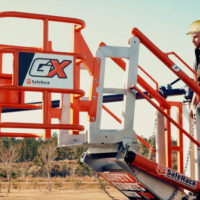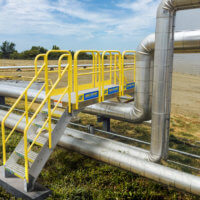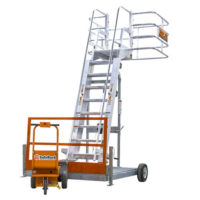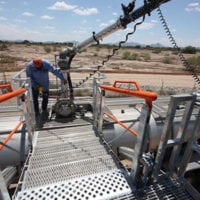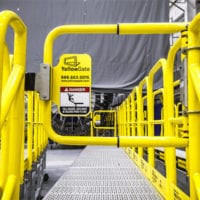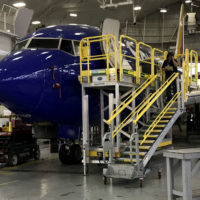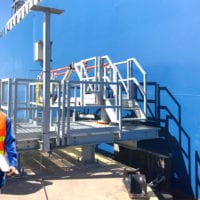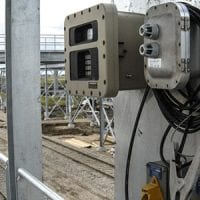Any production facility is going to have many obstructions. Things like pipelines or pieces of machinery can get in the way and make it difficult to move around. Metal stairs come to the rescue when accessing paths to these obstructions, providing a safe and easy way to get around them. Metal stairs are also durable and low maintenance, perfect for any production facility such as an oil depot pictured above. With metal stairs, you can rest assured that your employees can safely move around the facility without any problems.
Before having to resort to the need for personal protection equipment, explore inspecting slip, trip, and fall hazards in your facility, applying engineering controls, and creating administrative rules, as well as other assessing potential operational risks. A great example is when an obstruction to access stairs has a height of more than 9.5 inches (22 centimeters), safety managers must install an additional step to meet OSHA requirements.
What is the maximum rise or depth that OSHA requires one more step in a staircase?
9.5 inches (24 centimeters)
As it can be nearly difficult to keep pathways dry at all times — especially when it’s pouring or snowing — slip-resistant shoes may be a penultimate alternative for preventing slip and fall accidents. Shoes may need to follow some different safety standards, so it’s important to consider them before making a purchase. Work paths can become very slippery, which can present a safety hazard. The Department of the Interior reports that slips, trips, and falls account for around 23% of worker injuries and 36% of deaths in the oil and gas business.
Not even the most slip-resistant shoes can go as far as the finest when it comes to preventing slips and falls. Watch out for “slip-proof” shoes. If the area already has elevated grates or platforms, ice cleats might be another viable solution during winter. Contractors may even install concrete pads along a stair to stabilize it and prevent stairs from wobbling.
When activities are ongoing around the clock in an oil depot, it might not be easy to maintain tools and machinery. However, if they aren’t maintained and repaired regularly, they might threaten the public’s health and safety. Leaks from poorly maintained valves, pumps, and connections may cause pools of water on the floor that can be hazardous to your workers.
Inadequate maintenance practices may also contribute to additional hazards. For example, if oil pipelines aren’t properly serviced, they might leak, cause spills, and even unleash high-pressure gases.
Pumps, grease recovery systems, pump trucks, valves, and pretty much everything else on an oil terminal might leak, even when functioning properly. Oil and grease will get all over the apparatus and the spaces around it. A walkway might lose improved traction if non-slip flooring isn’t wiped down regularly.
So, you see, an oil terminal has many potential hazards. But with the proper metal stairs and platforms in place, you can help ensure the safety of your workers. Aluminum metal stairs offer many benefits over traditional wood or concrete stairs. They’re more durable than other materials, don’t rot, and are much easier to clean. Plus, they offer improved traction, essential in an environment where spills are common.
As Campbell Soup Company Grows into New Product Markets, Safety & Accessibility Take Center Stage



